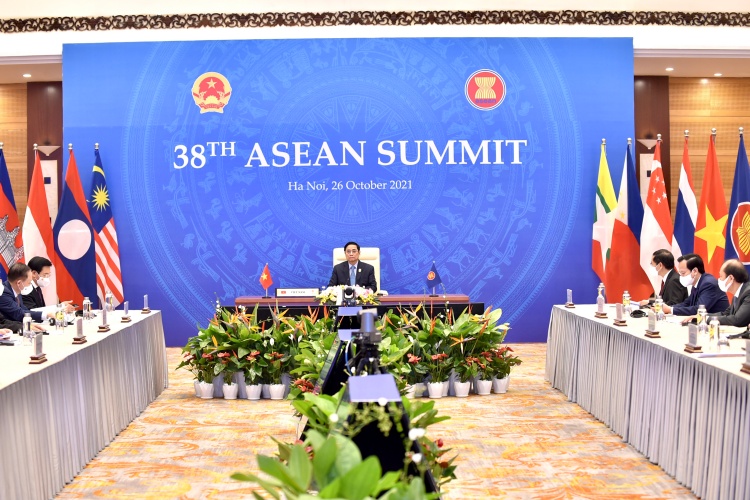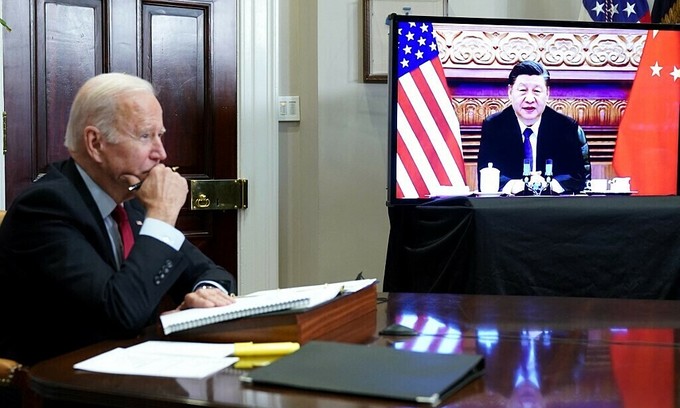Vietnam might have a more difficult balancing act in the new year since the superpower rivalry between the U.S. and China is expected to become more intense, experts warn.
“The U.S. – China strategic competition has intensified recently, but it is still in the beginning phase, and therefore this trend will continue in 2022,” Le Hong Hiep, a fellow at the ISEAS-Yusof Ishak Institute in Singapore, told VnExpress International.
The two countries have roughly the same strength in many areas, and no matter who is number one or number two, the two are competing with each other to maintain strategic superiority, he said.
Depending on the evolving international and domestic contexts, they may make short-term compromises to ease the situation, but in the long run the trend is one of increased competition in all spheres, he said.
“In that context, Vietnam, like other countries in the region, may get more attention from the U.S. and China as [they] focus on enticing allies and partners.”
Vietnam could have a more important position thanks to “strategic leverage” it has with the two superpowers in negotiations on various subjects, he said.
However, as the two intensify competition, they could form separate blocks which could constrain international cooperation and lead to global economic and technological fragmentation, supply disruptions and restrictions on trade, investment and technology flows across borders, hindering the growth of open economies like Vietnam, he said.
Besides, the strategic competition could draw countries into rival groups, causing a loss of their strategic autonomy, he pointed out.
Peace, security and stability could be threatened, and the resultant tension and uncertainty would be detrimental to the economic development of countries in the Asia Pacific and in fact the whole region, he said.
 |
|
Vietnamese Prime Minister Pham Minh Chinh (C) attends the virtual 38th ASEAN Summit on October 26, 2021. Photo by the Government Portal |
Dr Zachary Abuza of the National War College, Georgetown University Security Studies Program, the U.S, said the bilateral relationship between the U.S and China is quite bad and unlikely to improve any time soon.
He pointed out there were so many different disputes between Washington and Beijing like Taiwan, the Olympic boycott, militarization of the South China Sea, intellectual property theft, trade war, 5G, Hong Kong, and human rights that “it is impossible to really make progress resolving another.”
John West, executive director, The Asian Century Institute (ACI), an organization that does research and analysis of the opportunities and challenges in Asia, said the U.S.-China competition is very tense at the moment.
The Biden administration now is stepping up alliances with like-minded countries, such as through a trilateral security pact with Australia and the U.K. (AUKUS) and the so-called Quad with India, Japan and Australia.
He said these are examples of how the U.S. is trying to balance, or even contain, China’s rise, as Beijing gets “more assertive”, especially in the South China Sea. As the U.S Secretary of State Anthony Blinken said, the U.S. approach to China will be “competitive when it should be, collaborative when it can be and adversarial when it must be.”
These measures add to the tension in the region, as China is not pleased, especially in light of the two countries’ differences over Taiwan and Covid-19, he said.
In the South China Sea, the biggest risk is an accident between American and Chinese ships as the U.S. sends its ships there on freedom of navigation missions and to protest China’s “violation of international law” by building military facilities on islands, he said.
“If there is an accident, we don’t know what will happen – it will be important that neither side overreacts, but that cannot be guaranteed.”
The author of a recent book called ‘Asian Century … on a Knife-edge’ said Vietnam is in a difficult situation amid the rivalry, just like Japan and Australia.
These countries want to be politically friendly with the U.S., maintain economic ties with China, and be independent at the same time. This is a “very difficult balancing act,” he said.
 |
|
U.S. President Joe Biden speaks virtually with Chinese leader Xi Jinping from the White House in Washington, U.S., November 15, 2021. Photo by AFP |
Collin Koh Swee Lea, a research fellow at Singapore’s S. Rajaratnam School of International Studies, said the competition between the U.S. and China appears to have widened from economic, diplomatic, military, and public health dimensions to include a more prominent ideological aspect, he said.
In 2022 the world could expect the competition to persist as it is even as both Beijing and Washington seek to ensure it does not spiral out of control.
The so-called “common sense guardrails” Biden mentioned during his meeting with Xi are about managing this competition responsibly and at the same time seeking areas of common interest to cooperate in, though bouts of new flare-ups could be expected from time to time, he said.
In the South China Sea, countries could expect China’s behavior of coercion to continue as usual and the concerned Southeast Asian countries would keep engaging extra regional parties such as the U.S., he said.
West said while “balancing between the U.S. and China is an old story,” it might become more difficult next year for countries like Vietnam. There is a risk that the new Omicron variant makes the Covid situation worse in China in 2022. This could adversely affect the economy, which is already being shaken by the real estate crisis. Beijing could become more assertive in the South China Sea or on the Taiwan issue to distract public attention, he said.
“In these circumstances, Vietnam will have to manage things very carefully.”
- Reduce Hair Loss with PURA D’OR Gold Label Shampoo
- Castor Oil Has Made a “Huge” Difference With Hair and Brow Growth
- Excessive hair loss in men: Signs of illness that cannot be subjective
- Dịch Vụ SEO Website ở Los Angeles, CA: đưa trang web doanh nghiệp bạn lên top Google
- Nails Salon Sierra Madre
 VnExpress News The News Gateway of Vietnam
VnExpress News The News Gateway of Vietnam





